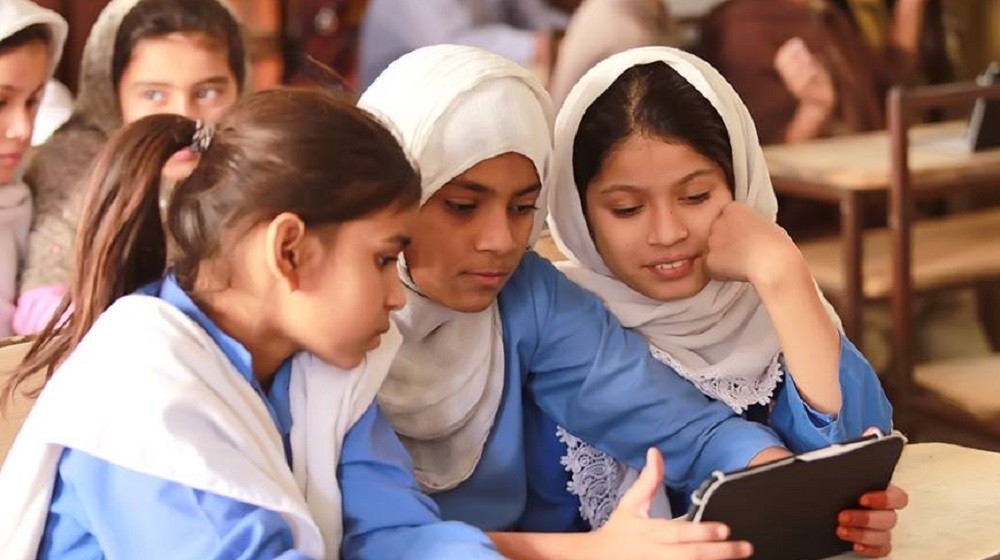As UN reports, large disruptions have been created in the education systems by the COVID-19 virus. Nearly 94% of the student population has been impacted due to the closure of educational and learning institutions, reports The News.
World Health Organization (WHO) declared COVID-19 a pandemic in March 2020, subsequently leading to a worldwide closure of schools, colleges, universities as a precautionary step. Nearly 1.6 million students in over 190 countries were impacted by the worldwide shut down; Pakistan being one of those 190 countries.
In Pakistan, the lives of 40 million students were disrupted, and put to a halt. While 10% of the private school students adjusted to online learning, there were millions (almost 35 million) who belonged to government schools or less expensive private schools, had no access to internet; even the schools lacked funds and resources to digitize their courses. These were the students who were abandoned by the system and really suffered a loss.
 Most of the students were will either repeat the year or defer their semester. Those who had applied abroad and started their academic years had to rush back; they might have to drop out and reapply.
Most of the students were will either repeat the year or defer their semester. Those who had applied abroad and started their academic years had to rush back; they might have to drop out and reapply.
The ones waiting for the GCSE results were under a lot of stress and pressure this year, owing to the uncertainty surrounding ‘grade prediction system’. Many O& Alevel students received downgraded results and protested. The year 2020 is definitely going down in history as the year of ‘uncertainty’ and ‘unpredictability’ for the education sector.
Here is a video of some of the students talking about how COVID-19 had impacted their lives, and some of their coping mechanisms:
Projects like Tele-School and Taleem Ghar were great initiatives but failed practically due several technical transmission problems. Moreover, the virus has aggravated the gap between the quality of education provided by private and public schools.
Subsequently, there has been a rise in the number of out of school and drop out children in the country. 22.8 million children in the country, between the age 5-16, do not attend school, making Pakistan a country with the second highest number of children who are out of school.
Schools Reopening from September 15th
Federal Education and Professional Training Ministry have decided to reopen schools from September 15th but there are several precautionary measures to be taken. Currently, there is no data available regarding positive coronavirus cases amongst children in Pakistan but in April only 2000 children had COVID-19 in Islamabad.
The number must have risen but must be nothing compared to how quickly the virus will spread amongst children and then be carried through them to households and neighborhoods, if schools open. Therefore, it is imperative for parents, students, teachers, and all other stakeholders to have a say and be heard.
Looking at the international scenario regarding reopening of schools, one must learn and apply better alternatives. For example, Chicago had planned on applying a hybrid model and begin the school year remotely, by sending children to school only two days a week. However, due to a rise in the number of cases in the U.S., the idea was opposed by both teachers and parents. Many teachers even protested and threatened to sue the schools if they reopen, citing how unsafe and unfair the decision is.
We Need Alternatives
According to an educationist Professor Anwar Ahmed Zai, who is the head of the private examinations board in Karachi, the government and educational institutes will have to create alternative plans to dilute the impact of COVID-19.
“Things will not be the same, whether it’s the economy or the education system. We have to reshape our education system and come up with some alternatives to bear the impact of the pandemic,” Zai told Anadolu Agency.
In order to ensure social distancing, he suggested that schools can operate in shifts of less time duration.
“It will not be an ideal situation but we have to explore our options. We have to live with this virus for at least the coming few years,” said Zai.
We can learn from countries like the U.S, Kenya, Israel and devise a similar plan.
Kenya decided to cancel the academic year fully and make students repeat grades. Indeed a drastic decision but many students from rural, remote areas would not have understood the concept of ‘online learning’ and would have suffered. To be fair, the school year was cancelled for all students in the country and will be resumed next year.
On the other hand, Israel reopened schools in May after Covid-19 was controlled but as new infections increased quickly and reached homes and neighborhoods, almost 240 schools were shut down and more than 22,500 teachers and students had to quarantine, reports the News.
A thorough health safety plan is needed before schools are reopened to be confident that none of the students and children will be infected- because if children become carriers, nothing can prevent a local and national outbreak.
The government of Pakistan needs to recognize that these decisions carry enormous social and economic implications and will have lasting effects on education, children and the youth, on their parents and societies as a whole.
Stay tuned for more interesting news and updates!
